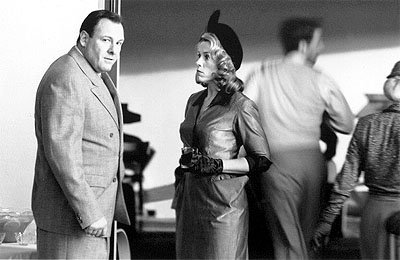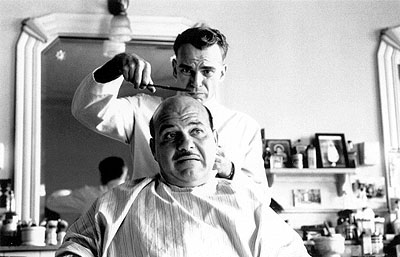

Ed Crane (Billy Bob Thornton, Bandits, South of Heaven, West of Hell) is a simple barber. He does not speak much; he just sits there and cuts hair. He is the title character of The Man Who Wasn't There is the Joel and Ethan Coen's homage to film noir, and garnered them a shared best director award with David Lynch (for Mulholland Falls) at the 2001 Cannes Film Festival. Shot in glorious black and white, Man brings in many of the familiar elements of the noir genre and adds a goofy, Coen brothers sensibility to the entire affair. The movie is about Crane and how he manages to embroil himself in all sorts of situations while remaining completely stoic and seemingly uncaring.
Crane works as second chair in a barbershop with his brother-in-law Frank (Michael Badalucco, O Brother, Where Art Thou?, Summer of Sam). Crane and his wife Doris (Frances McDormand, Scottsboro: An American Tragedy, Wonder Boys) have a marriage more of convenience than of love. She is having an affair with her boss Big Dave (James Gandolfini, The Last Castle, The Mexican). Crane knows, but does not care one whit. When he finally does, it is not because he wants the affair to end, but because he wants to blackmail Dave for money. Crane will put the money towards an investment in some new-fangled technology called dry-cleaning. Crane also has an interest in managing Birdy Abundas (Scarlett Johansson, Ghost World, An American Rhapsody), a young piano player.
Thornton's performance is great. Most of the time, his character is content to sit back and let the world happen around him. Every time he decides to do something, it goes horribly wrong. He carries a bored grimace throughout most of the movie, and most of the time that Thornton speaks is in voice over. It's almost as if the slightest movement is a serious undertaking for him. Crane is content to stare with his ever-present cigarette. Another good role goes to Tony Shalhoub (13 Ghosts, Spy Kids) as Freddy Riedenschneider, a fast-talking prissy big town lawyer. The Coens, like other current distinctive filmmakers (including Steven Soderbergh and Paul Thomas Anderson) enjoy using the same actors in different films. This allows them to familiarize themselves with each actor's strengths, with stronger performances resulting. McDormand is a good case in point. Her Doris displays a wide variety of range in emotions, and McDormand capably handles each one.
As with other Coen films, co-writer/director Joel and co-writer Ethan have a goofy sensibility that creeps into the dialogue. The Man Who Wasn't There is deadly serious at times and hilariously funny at others. Oddly enough, the contrast between the two does not feel out of place (it never seems to in their movies). The Coens also expertly use the black and white medium to its full advantage. It's much harder to film in black and white than one would think. Light and shadow figure prominently, hiding or highlighting characters and surroundings. The Man Who Wasn't There is awash in a dizzying scale of whites and grays. The final scenes of the movie are particularly effective. So the film remains an homage to archetypes and techniques from yesteryear, but still manages to stay fresh and engaging.